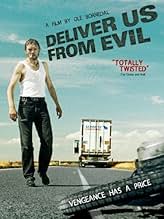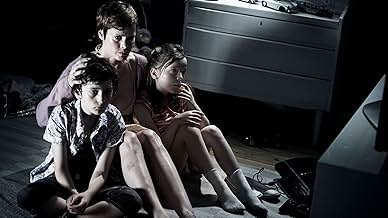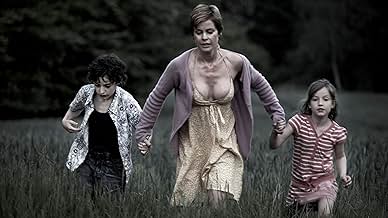NOTE IMDb
6,5/10
2,2 k
MA NOTE
Ajouter une intrigue dans votre langueA father returns to his old hometown with his young family. Events force him to face the small town's xenophobia.A father returns to his old hometown with his young family. Events force him to face the small town's xenophobia.A father returns to his old hometown with his young family. Events force him to face the small town's xenophobia.
- Réalisation
- Scénario
- Casting principal
- Récompenses
- 5 victoires et 11 nominations au total
Lene Nystrøm
- Pernille
- (as Lene Nystrøm Rasted)
Fanny Leander Bornedal
- Viola
- (as Fanny Bornedal)
Jacob Ottensten
- Frederik
- (as Jacob August Ottensten)
Alexandre Willaume
- Roald
- (as Alexandre Willaume-Jantzen)
Anders Budde Christensen
- Silver
- (as Anders Budde)
Avis à la une
The only good thing about this movie was the acting from Jens Andersen which was excellent. Else this movie was just total nonsense. Exaggerated in every sense and during the entire movie I was thinking what the hell is this. It tries to describe the life of people in the suburb and trying to make it interesting, pointless exaggerated violence is created.
For this movie Ole Bornedal really failed.
the acting from Aqua Lene was also okay.
Lasse Rimmer is bad casted for this movie. He is to nice guy material and gives his part a science fiction feeling
For this movie Ole Bornedal really failed.
the acting from Aqua Lene was also okay.
Lasse Rimmer is bad casted for this movie. He is to nice guy material and gives his part a science fiction feeling
"Deliver Us From Evil" is a Danish film written and directed by Ole Bornedal. The film is set in the Danish countryside, after a young father moves back to his hometown with his family, where circumstances soon follow that force him to defend his family, and the way they live their life as well. On the surface, this is a stylish thriller both beautiful and brutal, with events that bring to mind Sam Peckinpah's 1971 classic "Straw Dogs." However, "Deliver Us From Evil," maintains a certain tone that prevents it from reaching the same emotional and psychological impact of its predecessor.
Lars (Jens Andersen) and Johannes (Lasse Rimmer), are brothers with very little in common. Johannes is a high-powered lawyer with a beautiful wife and two children; Lars is a drunken truck driver who beats his girlfriend. Having returned to his hometown in the country, Johannes hopes for a less hectic, more genuine lifestyle. But trouble is underfoot when Lars runs over a woman with his truck. He sees only one-way out: put the blame on Alain (Bojan Navojec), a Bosnian refugee with impaired mental functions. Led by the dead woman's husband, a retired colonel whose son was killed in the Serbian theater, the town's population of angry drunks and bitter workingmen instantly jump at the chance to crucify the outsider, but Johannes stands in their way, motivated by his sense of amorality. Undeterred, the violent, drunken horde makes their way to Johannes' secluded house, where the family and Alain fear for their lives. The house is converted into a fortress, where the madness and siege begins.
An engaging, yet over determined setup, the movie does little to complicate. What few twists in the story that exist, don't add to much of anything shocking or memorable. Perhaps it's the saturated high contrast of the cinematography, that while absolutely stunning, it gives the film an artificial feel. The cast is of one-dimensional clichéd characters, who all play predictable roles. The strange choice for a narrator whose introduction of the story makes it seem like it's a family comedy, and not a gripping thriller that is about to unfold. The end result is a brutally violent climactic showdown that may be visceral and exciting, but lacks the grit or the emotional involvement that would have made this one a classic in its own right.
Lars (Jens Andersen) and Johannes (Lasse Rimmer), are brothers with very little in common. Johannes is a high-powered lawyer with a beautiful wife and two children; Lars is a drunken truck driver who beats his girlfriend. Having returned to his hometown in the country, Johannes hopes for a less hectic, more genuine lifestyle. But trouble is underfoot when Lars runs over a woman with his truck. He sees only one-way out: put the blame on Alain (Bojan Navojec), a Bosnian refugee with impaired mental functions. Led by the dead woman's husband, a retired colonel whose son was killed in the Serbian theater, the town's population of angry drunks and bitter workingmen instantly jump at the chance to crucify the outsider, but Johannes stands in their way, motivated by his sense of amorality. Undeterred, the violent, drunken horde makes their way to Johannes' secluded house, where the family and Alain fear for their lives. The house is converted into a fortress, where the madness and siege begins.
An engaging, yet over determined setup, the movie does little to complicate. What few twists in the story that exist, don't add to much of anything shocking or memorable. Perhaps it's the saturated high contrast of the cinematography, that while absolutely stunning, it gives the film an artificial feel. The cast is of one-dimensional clichéd characters, who all play predictable roles. The strange choice for a narrator whose introduction of the story makes it seem like it's a family comedy, and not a gripping thriller that is about to unfold. The end result is a brutally violent climactic showdown that may be visceral and exciting, but lacks the grit or the emotional involvement that would have made this one a classic in its own right.
The newest Ole Bornedal film is a continued exploration of styles, themes and content not normally associated with Danish cinema. Following the awesome meta-film noir 'Just Another Love Story' and the great children's horror/sci-fi 'The Substitute', 'Deliver Us from Evil' is like no Scandinavian film you've ever seen before. Not to say that this is a wholly original work of art, it's not, however, the combination of all the elements makes it unique as a Danish movie.
In the story, not too dissimilar to Straw dogs, we're in hillbilly territory, where one man tries to do the right thing and has to defend himself and his family against outsiders. Everyone accept the main family acts extremely over the top in a wonderful dramatic way but still strangely rooted in Danish society. You are in disbelief but still you feel that these obnoxious, unpleasant characters could be quite real.
The cinematography by Danish legend Dan Lausten is nothing short of brilliant and all actors shine, even though most of them are cast against type or comes from different backgrounds than movies. 'Deliver Us from Evil' is so well made on all accounts that it can only be described as a Danish masterpiece. It wouldn't necessarily be a masterpiece had it been made in the US, but perfecting the western genre, flirting with horror, making social comments, all grounded in a Danish setting with thrills and kills, this is as good as it's going to get. And Ole Bornedal, once the great talent, has through recent years, enriched Danish film more than anyone, except maybe Von Trier.
In the story, not too dissimilar to Straw dogs, we're in hillbilly territory, where one man tries to do the right thing and has to defend himself and his family against outsiders. Everyone accept the main family acts extremely over the top in a wonderful dramatic way but still strangely rooted in Danish society. You are in disbelief but still you feel that these obnoxious, unpleasant characters could be quite real.
The cinematography by Danish legend Dan Lausten is nothing short of brilliant and all actors shine, even though most of them are cast against type or comes from different backgrounds than movies. 'Deliver Us from Evil' is so well made on all accounts that it can only be described as a Danish masterpiece. It wouldn't necessarily be a masterpiece had it been made in the US, but perfecting the western genre, flirting with horror, making social comments, all grounded in a Danish setting with thrills and kills, this is as good as it's going to get. And Ole Bornedal, once the great talent, has through recent years, enriched Danish film more than anyone, except maybe Von Trier.
If you wanna compare this movie with another movie, you could compare it with the classic "Straw Dogs" (Dustin Hoffman, Directed by Sam Peckinpah)! And it plays in that League, because it is really good, acting-wise and story-wise!
Having said that, of course if you don't know what to expect, you might be disappointed, as can be seen, by another reviewer on this site. Of course he is just warning other people, that might have the same problem he had, just don't let that cloud you own judgement and if you can go and watch this little dark thriller, with more humanity than quite a few other movies with similar stories.
Having said that, of course if you don't know what to expect, you might be disappointed, as can be seen, by another reviewer on this site. Of course he is just warning other people, that might have the same problem he had, just don't let that cloud you own judgement and if you can go and watch this little dark thriller, with more humanity than quite a few other movies with similar stories.
Xenophobia. Xen-o-pho-bi-a. Noun: an unreasonable fear or hatred of foreigners or strangers or of that which is foreign or strange. The definition of the word does not only describe in one word the main theme of Ole Bornedal's latest film but also the vast majority of main and supportive characters that appear in the story. The writer/director of "Nattevagten" – which still stands as one of the best European thrillers ever made according to yours truly – serves us a simplistic and sadly identifiable story, set in a remote little community where everyone knows and accepts each other but distrusts and reject outsiders. Imagine yourself the type of place where a traumatized war fugitive tries hard to fit in and accept jobs that nobody else wants, but at the same time the local drunks and lowlifes complain that these immigrants are stealing their jobs. This is a controversial but sadly all too familiar topic, and it takes a talented and courageous director to make a confronting – albeit sometimes grotesque and exaggerated – movie out of it.
Johannes and his family return back to his birthplace in the countryside, where they bought an old mansion that he is renovating with the more than welcome help of a Bosnian fugitive named Alain. Most of the town folks are marginal proletarians, however, like Johannes' brother Lars who's an alcoholic, pregnant girlfriend beating truck driver. On the day before the town's annual highlight – a carnival with a beer tent – Lars runs his truck over a sweet old granny who was on her way to the chapel on her moped. Lars frames Bosnian immigrant Alain for her death, which instantly causes the entire town to go on an aggressive and drunken manhunt. Johannes is the only person protecting Alain and they all entrench themselves in the house as the outrageous lynch mob arrives.
I watched "Deliver Us From Evil" at the Belgian Festival of Fantastic Films, where Ole Bornedal was present to introduce the movie himself. He said this was probably the most brutal movie he'd ever make. He's right, of course, but there simply isn't any other way to tell such a raw and shocking but sadly realistic story. According to Bornedal, the media and politicians want to make us believe that bad people only live in the Middle Eastern area, but this movie and its crude but recognizable characters prove otherwise. The comparisons with Sam Peckinpah's early 70's classic "Straw Dogs" are more than justified. Both film slowly but uncannily build up towards a shocking climax that only leaves behind victims. The dead and dying can't repent for the type of sins they committed and even the survivors won't be able to live happily ever after. If you decide to watch "Deliver Us From Evil", prepare yourself for devastating viewing experience, with a continuously unpleasant atmosphere and a number of truly gritty images, that will spook through your head for several more days. But it's more than worth it.
Johannes and his family return back to his birthplace in the countryside, where they bought an old mansion that he is renovating with the more than welcome help of a Bosnian fugitive named Alain. Most of the town folks are marginal proletarians, however, like Johannes' brother Lars who's an alcoholic, pregnant girlfriend beating truck driver. On the day before the town's annual highlight – a carnival with a beer tent – Lars runs his truck over a sweet old granny who was on her way to the chapel on her moped. Lars frames Bosnian immigrant Alain for her death, which instantly causes the entire town to go on an aggressive and drunken manhunt. Johannes is the only person protecting Alain and they all entrench themselves in the house as the outrageous lynch mob arrives.
I watched "Deliver Us From Evil" at the Belgian Festival of Fantastic Films, where Ole Bornedal was present to introduce the movie himself. He said this was probably the most brutal movie he'd ever make. He's right, of course, but there simply isn't any other way to tell such a raw and shocking but sadly realistic story. According to Bornedal, the media and politicians want to make us believe that bad people only live in the Middle Eastern area, but this movie and its crude but recognizable characters prove otherwise. The comparisons with Sam Peckinpah's early 70's classic "Straw Dogs" are more than justified. Both film slowly but uncannily build up towards a shocking climax that only leaves behind victims. The dead and dying can't repent for the type of sins they committed and even the survivors won't be able to live happily ever after. If you decide to watch "Deliver Us From Evil", prepare yourself for devastating viewing experience, with a continuously unpleasant atmosphere and a number of truly gritty images, that will spook through your head for several more days. But it's more than worth it.
Le saviez-vous
- ConnexionsReferenced in Zulu Late Night, Live!: Lasse Rimmer/B.S. Christiansen (2009)
Meilleurs choix
Connectez-vous pour évaluer et suivre la liste de favoris afin de recevoir des recommandations personnalisées
- How long is Deliver Us from Evil?Alimenté par Alexa
Détails
Box-office
- Montant brut mondial
- 69 513 $US
- Durée1 heure 40 minutes
- Couleur
Contribuer à cette page
Suggérer une modification ou ajouter du contenu manquant

Lacune principale
By what name was Fri os fra det onde (2009) officially released in Canada in English?
Répondre





















